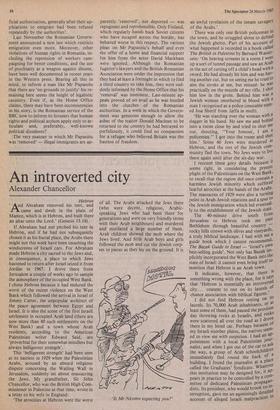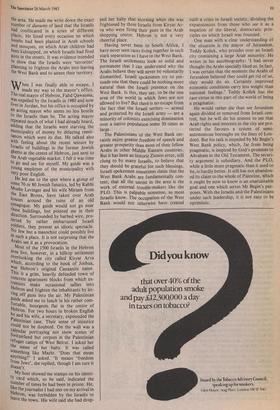An introverted city
Alexander Chancellor
Hebron And Abraham removed his tent, and
came and dwelt in the plain of Mamre, which is in Hebron, and built there an altar unto the Lord.' (Genesis 13.18).
If Abraham had not pitched his tent in Hebron, and if he had not subsequently chosen it as his burial place, the Arabs there might not this week have been smashing the windscreens of Israeli cars. For Abraham made Hebron a city sacred to the Jews and, in consequence, a place to which Jews hastened to return after Israel seized it from Jordan in 1967. I drove there from Jerusalem a couple of weeks ago to sample the atmosphere of the occupied West Bank. I chose Hebron because it had endured the worst of the recent violence on the West Bank which followed the arrival in Israel of Jimmy Carter, the unpopular architect of the peace agreement between Egypt and Israel. It is also the scene of the first Israeli settlement in occupied Arab land (there are now more than 80 such settlements on the West Bank) and a town whose Arab residents, according to the American Palestinian writer Edward Said, are 'proverbial for their somewhat mindless but always belligerent strength'.
This 'belligerent strength' had been seen at its nastiest in 1929 when the Palestinian Arabs, aroused by an absurd religious dispute concerning the Wailing Wall in Jerusalem, suddenly set about massacring the Jews. My grandfather, Sir John Chancellor, who was the British High Com- missioner in Palestine at that time, wrote in a letter to his wife in England: 'The atrocities at Hebron were the worst of all. The Arabs attacked the Jews there (who were decent, religious, Arabic- speaking Jews who had been there for generations and were on very friendly terms with their Arab neighbours) and murdered and mutilated a large number of them. Arab children showed the mob where the Jews lived. And little Arab boys and girls followed the mob and cut the Jewish corp- ses to pieces as they lay on the ground. It is 'Is Mr Nkomo expecting you?' an awful revelation of the innate savagerY of the Arabs.'
There was only one British policeman in the town, and he struggled alone to defend the Jewish ghetto. Part of his account of what happened is recorded in a book called The British in Palestine by Bernard Wasser- sein: 'On hearing screams in a room I went up a sort of tunnel passage and saw an Arab in the act of cutting off a child's head with a sword. He had already hit him and was hav- ing another cut, but on seeing me he tried to aim the stroke at me, but missed: he was practically on the muzzle of my rifle. I shot him low in the groin. Behind him was 3 Jewish woman smothered in blood with 3 man I recognised as a police constable natty- ed Issa Sherif from Jaffa in mufti.
'He was standing over the woman with a dagger in his hand. He saw me and bolted into a room close by and tried to shut me out, shouting, "Your honour, I am 3 policeman." I got into the room and shot him.' Some 60 Jews were murdered In Hebron, and the rest of the Jewish com- munity fled the town. No Jews were to live there again until after the six-day war. I recount these gory details because it seems right, in considering the present plight of the Palestinians on the West Bank, to recall that the region did once contain a harmless Jewish minority which suffered fearful atrocities at the hands of the Arabs. The massacres of 1929 were also a turning point in Arab-Jewish relations and a spur t° the Jewish immigration which led eventual- ly to the establishment of the Jewish state. The 40-minute drive south from Jerusalem to Hebron took me Past Bethlehem through beautiful country — rocky hills strewn with olives and vineyards, a truly biblical landscape. I had with me 3 guide book which I cannot recommend, The Bazak Guide to Israel — 'Israel's own best-selling guide'. Not only has Bazak im- plicitly incorporated the West Bank into the state of Israel: it cannot even bring itself to mention that Hebron is an Arab town.
It indicates, however, that there is something wrong with the place, for it saYs that 'Hebron is essentially an introverted city... content to rest on its laurels :PI chance association with biblical figures. I did not find Hebron resting on Its laurels. Its 70,000 Arab inhabitants, or at least some of them, had passed the previous day throwing rocks at Israelis, and rocks were scattered all over the road as I drove there in my hired car. Perhaps because 01 my Israeli number plates, the natives seenl- ed to view me with suspicion. I had an aP- pointment with a local Palestinian low,: nalist, and when I got out of the car to ass the way, a group of Arab schoolchildren immediately fled round the back of 3 building. I found the journalist at a place called the Graduates' Syndicate. Whatever this institution may be designed for, it al/- pears in practice to be controlled by a com- mittee of dedicated Palestinian propagan- dists. Its president, who would brook no. Ind- terruption, gave me an agonisingly detatle account of alleged Israeli malpractices in the area. He made me write down the exact number of dunums of land that the Israelis had confiscated in a score of different Places. He listed every occasion on which bombs had been planted in Arab schools and mosques, on which Arab children had been kidnapped, on which Israelis had fired guns in the streets. It was evidence intended to show that the Israelis were 'terrorists' Planning to frighten the Arabs into leaving the West Bank and to annex their territory.
When I was finally able to escape, I made my way to the mayor's office. The real mayor of Hebron, Fahd Qawasma, Was expelled by the Israelis in 1980 and now lives in Jordan, but his office is occupied by an acting mayor who seems no less hostile to the Israelis than he. The acting mayor repeated much of what I had already heard, adding that the Israelis were starving the Municipality of money by delaying remit- tances which were its due. He talked also With feeling about the recent seizure by Israelis of buildings in the former Jewish ghetto at the centre of Hebron, just next to the Arab vegetable market. I felt it was time to go and see for myself. My guide was a Young employee of the municipality with verY poor English. He led me to the spot where a group of some 70 or 80 Jewish fanatics, led by Rabbi Moshe Levinger and his wife Miriam from the East Bronx, have taken over Arab houses around the ruins of an old sYnagogue. My guide would not go near these buildings, but pointed me in their direction. Surrounded by barbed wire, pro- tected by rather embarrassed Israeli soldiers, they present an idiotic spectacle. No Jew but a masochist could possibly live In such a place. It is not surprising that the Arabs see it as a provocation. Most of the 1500 Israelis in the Hebron area live, however, in a hilltop settlement overlooking the city called Kiryat Arva Which, according to the book of Joshua, was Hebron's original Canaanite name. This is a grim, heavily defended town of concrete apartment blocks from which ex- tremists make occasional sallies into Hebron and frighten the inhabitants by let- ting
guns into the air. My Palestinian
guide asked me to lunch in his rather com- fortable, bourgeois flat in the centre of Hebron. For two hours in broken English h_e and his wife, a secretary, expounded the Palestinian case. Their sense of injustice could not be doubted. On the wall was a calendar portraying not snow scenes of Switzerland but corpses in the Palestinian refugee camps of West Beirut. I asked her the name of her baby. It was called something like Mazht. 'Does that mean anything? I asked. 'It means 'freedom from Jews', she replied, though I am sure it doesn' t, My host showed me stamps on his identi- tY card which, so he said, indicated the number of times he had been in prison. He, like the journalist I had met on my arrival in Hebron, was forbidden by the Israelis to leave the town. His wife said she had drop-
pecl her baby that morning when she was frightened by three Israelis from Kiryat Ar- va who were firing their guns in the Arab shopping centre. Hebron is not a very cheerful place.
Having never been to South Africa, I have never seen races living together in such stark separation as I have in the West Bank. The Israeli settlements look so solid and permanent that I can understand why the Arabs believe they will never be voluntarily dismantled. Israeli spokesmen try to per- suade one that there could be nothing more natural than the Israeli presence on the West Bank. Is this, they say, to be the one area of the world in which Jews are not allowed to live? But there is no escape from the fact that the Israeli settlers — armed and protected by the Israeli army — are a minority of colonists exercising domination over a native population some 30 times as large.
The Palestinians of the West Bank cer- tainly enjoy greater freedom of speech and greater prosperity than most of their fellow Arabs in other Middle Eastern countries. But it has been an historic Zionist error, still clung to by many Israelis, to believe that they should be grateful for such blessings. Israeli spokesmen sometimes claim that the West Bank Arabs are fundamentally con- tent, that all the unrest in the area is the work of external trouble-makers like the PLO. This is palpable nonsense, as most Israelis know. The occupation of the West Bank would not otherwise have created
such a crisis in Israeli society, dividing the expansionists from those who see it as a negation of the liberal, democratic prin- ciples on which Israeli was founded.
One man with a clear understanding of the situation is the mayor of Jerusalem, Teddy Kollek, who presides over an Israeli city containing a large Arab minority. He writes in his autobiography: 'I had never thought the Arabs specially liked us. In fact, 1 was certain that the moment the Arabs of Jerusalem believed they could get rid of us, they would do so. Certainly improved economic conditions carry less weight than national feelings.' Teddy Kollek has the rare virtue in this part of the world of being a pragmatist.
He would rather die than see Jerusalem again divided or removed from Israeli con- trol, but he will do his utmost to see that Arab rights and interests in the city are pro- tected (he favours a system of semi- autonomous boroughs on the lines of Lon- don). But his task is impeded by Mr Begin's West Bank policy, which, far from being pragmatic, is inspired by God's promises to Abraham in the Old Testament. The securi- ty argument is subsidiary. And the PLO, while a little more pragmatic than it used to be, is hardly better. It still has not abandon- ed its claim to the whole of Palestine, which it ought by now to know is an unattainable goal and one which serves Mr Begin's pur- poses. With the Israelis and the Palestinians under such leadership, it is not easy to be optimistic.















































 Previous page
Previous page